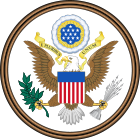- Copyright Act of 1831
-
Copyright Act of 1831 
Full title An Act to Amend the Several Acts Respecting Copyrights Effective February 3, 1831 Citations Stat. 4 Stat. 436 Codification Legislative history - Introduced in the House of Representatives as H.R. 145 by William Ellsworth on January 21, 1830
- Committee consideration by: House Judiciary Committee, Senate Judiciary Committee
- Passed the House on January 10, 1831 (81-31)
- Passed the Senate on January 29, 1831 ()
- Signed into law by President Andrew Jackson on February 31, 1831
Major amendments Relevant Supreme Court cases The Copyright Act of 1831 was the first general revision to United States copyright law. The bill is largely the result of lobbying efforts by American lexicographer Noah Webster.
The key changes in the Act included:
- Extension of the original copyright term from 14 years to 28 years, with an option to renew the copyright for another 14 years
- Addition of musical compositions to the list of statutorily protected works (though this protection only extended to reproductions of compositions in printed form; the public performance right was not recognized until later)
- Extension of the statute of limitations on copyright actions from one year to two
- Changes in copyright formality requirements
See also
References
- 1 Patry, William (2009), Patry on Copyright § 1:23
- Bracha, O. (2008) ‘Commentary on the U.S. Copyright Act 1831', in Primary Sources on Copyright (1450-1900), eds L. Bently & M. Kretschmer, http://www.copyrighthistory.org
External links
 Works related to Copyright Act of 1831 at Wikisource
Works related to Copyright Act of 1831 at Wikisource- Full text of the Copyright Act of 1831, as passed
Categories:- United States federal copyright legislation
- Legal history of the United States
Wikimedia Foundation. 2010.
